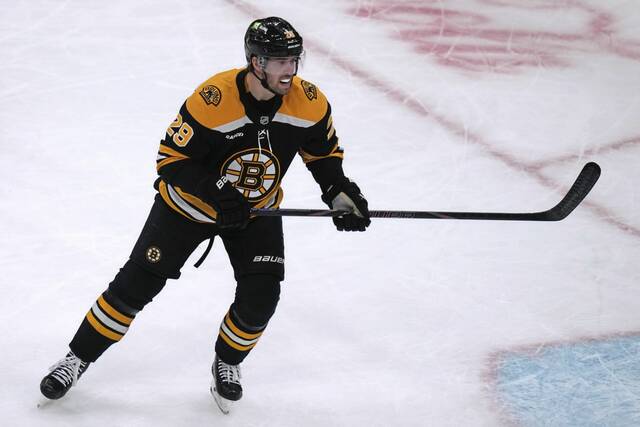When the Pittsburgh Penguins’ 2024-25 campaign ended without a postseason appearance, stretching their playoff drought to three years, Kyle Dubas was blunt in discussing one shortcoming of the club’s overall game.
“I think the left side of our defense, it’s been a problem,” the Penguins’ president of hockey operations/general manager said April 21. “There’s just no other way (to put it). … That’s an area I think, externally, that we have to (improve).”
Over three months later, the dust has largely settled on Dubas’ external approach at bolstering the Penguins, including the left side of the blue line.
Left-shooting defenseman Alexander Alexeyev, 25, was brought in one a one-year deal ($775,000 annually), while 28-year-old Caleb Jones joined the Penguins for two at $900,000 average annual value.
But if salary and term are to be viewed as barometers for a player’s overall importance, than Parker Wotherspoon represents the most significant component of Dubas’ external solution in improving the Penguins’ left-side defensive woes.
Wotherspoon, 27, signed a two-year, $2 million deal with Pittsburgh on July 1, the opening day of the NHL free agency period.
“When I started talking with Pittsburgh, right from the get-go, it seemed like there was a good connection there,” Wotherspoon said by video chat Monday. “They seemed interested, we seemed interested and we thought it’d be a good fit with some opportunity to play. … An opportunity to get back in the playoffs is all I wanted to do. Everything just kind of lined up really well.”
A 6-foot-1, 192-pound blue-liner originally selected in the fourth round (No. 112 overall) by the New York Islanders in 2015, Wotherspoon played the last two seasons with the Boston Bruins, appearing in 96 combined games with a goal and 14 assists.
Last season, he set numerous career-highs, including games (55) and minutes (18:02), while netting his first NHL goal Jan. 14 and adding six assists.
Wotherspoon was also active on the penalty kill, averaging 1:20 of short-handed ice time per contest, and can play both sides of a defensive pairing.
Great, deceptive pass from Pastrnak, to set-up Parker Wotherspoon’s first NHL goal. 2-0 BOS. #NHLBruins pic.twitter.com/CV9Re5ckVa
— Brian DeFelice (@briandefelice_) January 15, 2025
In total, he’s appeared in 108 NHL games.
With the Bruins finishing last in the Atlantic Division, Wotherspoon could relate to the Penguins’ disappointment of missing the playoffs.
That said, he reflected on his time in Boston as beneficial to his development as an NHLer.
“Tough season – we didn’t make the playoffs or were where we wanted to be,” he said. “But with the extra playing time, I felt like I was growing every game, playing more and more, especially when I got the bigger role with the (penalty kill). …
“Takes a little bit to get your feet wet for the game to slow down. I was finding that a little bit more at the end of the year, just playing more confidently. You can only get that way when you’re playing more.”
If Wotherspoon, Alexeyev and Jones constitute the external improvements to the Penguins’ contingent of left-shooting defensemen, Ryan Shea and Graves represent parts of the in-house solution, as both are back in 2025-26.
Former first-round pick Owen Pickering, 21, is also expected to compete for an NHL roster spot opening night at the conclusion of preseason camp, while Sebastian Aho is signed for one more season.
While he hasn’t delved too deeply into the Penguins’ full personnel situation at his position, as well as the club’s system under first-year coach Dan Muse, initial impressions have been positive.
“I’ve had a few conversations with Dan,” Wotherspoon said. “He seems like a really good guy. I’ve heard good things. I’ve had a few players that I’ve talked to say he’s going to be straightforward and that he’s hardworking. So, right up my alley.”
Notable in Wotherspoon’s performance last season was that he took only five minor penalties – 10 minutes in all – over 55 games.
For Wotherspoon, that wasn’t suggestive of him playing a relaxed, nonphysical kind of game.
Quite the opposite.
Wotherspoon doesn’t shy away from using his body on the ice, and doing so in a way that doesn’t result in unnecessary trips to the penalty box.
“With the style I play, I play aggressive and hard and try to be as physical as possible,” he said. “But I just kind of learned growing up and going through those years of being in the minors and a couple years in the NHL – just stay off the refs, keep it between the whistles and you’re not going to have many minors.
“Especially in my situation, if you’re taking minors and hurting the team, you’re helping no one. I do my best to stay out of (the penalty box).”
Justin Guerriero is a TribLive reporter covering the Penguins, Pirates and college sports. A Pittsburgh native, he is a Central Catholic and University of Colorado graduate. He joined the Trib in 2022 after covering the Colorado Buffaloes for Rivals and freelancing for the Denver Post. He can be reached at jguerriero@triblive.com.
